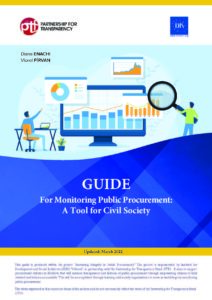
REPORT
Guide for Monitoring Public Procurement: A Tool for Civil Society
Public procurement refers to the procurement of goods, services, and works carried out by public authorities at all levels, e.g., national, regional, and local, with public money or resources accrued in the public budgets. The efficient use of public money, transparency, competition and fighting anti-competition practices, environmental protection, and promotion of sustainable development are among the fundamental principles of a sound public procurement process. Efficient and transparent public procurement is at the core of good governance.
By overseeing the manner in which public money is used, civil society can significantly contribute to strengthening governance and building bridges between society and public authorities at all levels. International experience has shown that civil society organizations (CSOs) can play an active and important role in direct monitoring of public procurement, thus contributing to increased transparency at all stages of the procurement cycle from tendering to awarding and performance of procurement of contracts. They can demand accountability when public contracting authorities fail to observe the principles of transparency, integrity, and efficiency in the procurement process or are part of corrupt schemes by referring cases of abuse to supervisory bodies and law enforcement entities.
This guide, first developed for Moldova, but whose principles are applicable in other contexts, is intended to support CSOs, civic monitors, and investigative journalists in their monitoring of public procurement at all levels and in any domain. The guide was developed based on the monitoring methodology of the U.S. Transparency International Civil Society Procurement Monitoring Tool.

